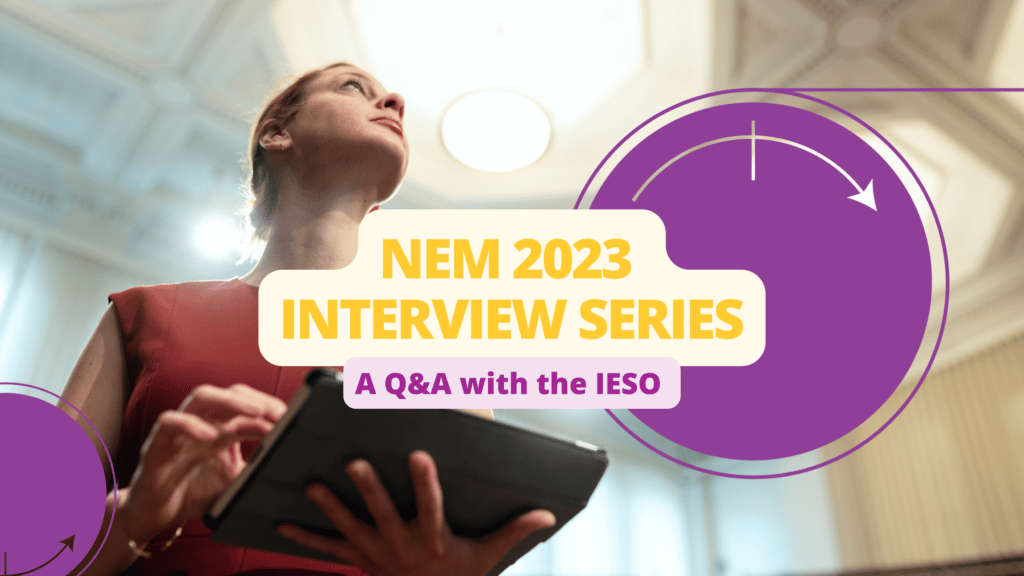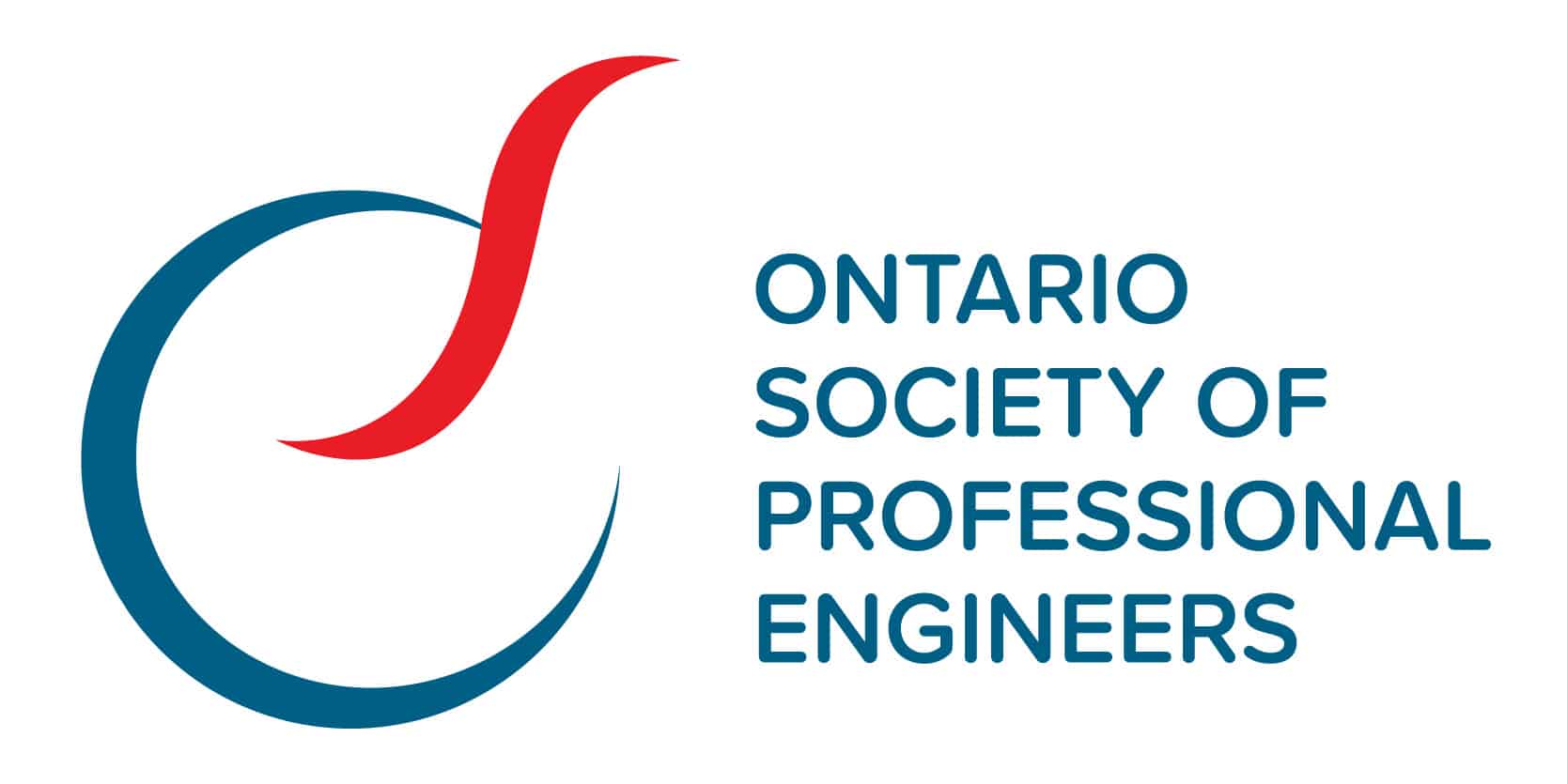
In the lead-up to National Engineering Month, we are seeking out and speaking with influential leaders within Ontario’s engineering sectors to gain a sense of where they see the industry heading.
The following Q&A is with Robby Sohi, who is Chief Operating Officer and Vice-President, Markets, and Reliability at the Independent Electricity System Operator (IESO). What follows is a conversation about how Ontario’s energy sector is changing and how the IESO is looking for more engineers (like you) to help shape the future.
- Tell me a bit about yourself & your background.
I was born and raised in India. I moved to Canada in 1984 and graduated from McMaster University with a Bachelor of Electrical Engineering degree in 1991. My Bachelor of Engineering degree was completed during the last summer co-op I had at Ontario Hydro. I started working as a Junior Engineer at Ontario Hydro in 1991, working in the field as a Protection and Control Systems Engineer. I have over 30 years of diverse experience in the utility sector, primarily in generation, transmission, and distribution. I consider myself fortunate to have had field experience early in my career, which has been very helpful in my current position as Chief Operating Officer at the IESO. I previously held senior roles in power plant operation, asset management, engineering, supply chain and corporate business development at OPG. In addition, I served as President and CEO of Global First Power, which is leading the development of Canada’s first Micro Modular Reactor at Chalk River, which is expected to be commissioned and in service towards the latter part of this decade.
- Why is National Engineering Month important to the IESO and the engineering profession overall?
I am fairly new in my role at the IESO, having started in September of 2022. My observation is that this organization has amazing technical capabilities. We have engineering talent throughout the organization and across all departments. We hire a lot of engineers, business students, and people who do technical analysis. National Engineering Month is a platform for us to recognize and celebrate the great work our staff do, as well as the important work they do. It is also a great way to recognize and celebrate engineering excellence, diversity of thought, and opportunities for our people.
From a broader perspective, I see National Engineering Month as a platform to spark interest in the next generation of engineering talent and professionals. We are at a pivotal point in the energy sector, and the electricity sector is a critical part of the global energy transition. To accommodate future demand, the electricity system in Ontario, for example, must grow by a factor of two or more over the next 20+ years. At the IESO, we provide essential services in the industry and we are already going through unprecedented change. National Engineering Month gives us the platform to share the exciting work we are doing and attract the next generation of engineers, who we hope will make an impact in the energy sector broadly.
- The theme for NEM 2023 is lifelong learning. What does the concept of lifelong learning mean to you? Why is lifelong learning important in the work you do?
I am a firm believer that people with diverse perspectives make better decisions. And I think the broader perspective comes from diverse experiences and focusing on a lifelong journey. I always tell my folks that a broader perspective can’t be obtained by reading a book or going to a classroom – you actually have to do different things. I can certainly attest to this in the work I do today and throughout my career journey. I always have an open mind when someone asks me to try something different in the workplace. I’ve never said no to work of a different nature, even when I wasn’t comfortable with it. I have always felt that if I try something different, I’ll learn and grow. And I encourage that attitude with all my staff. In fact, I encourage my leadership team to talk to their folks and ask them, other than what they’re doing today, what else would they like to do? That’s how we grow our people.
At the IESO, operating the power system requires foresight, analytical capability, and highly sophisticated systems and tools, as well as fully engaged employees with the skills and expertise to manage those changes. That’s why we embrace lifelong learning and take a lot of pride in our ability to integrate rapidly changing technologies and ideas. If things are coming at us, we’re able to adapt and manage, and continuous learning is essential to the success of IESO. It’s an area where we excel. If I look around the organization, so many of our employees that used to work in operations, move to planning, and now they’re working in innovation, for example. That speaks to the sort of lifelong learning that’s ingrained in the IESO’s succession planning.
Combining the incredible technical knowledge and the depth of flexibility and adaptability our staff display is important in a fast-changing world. For example, right now we have an RFP in the market to procure resources, including many energy storage projects that are coming onto the grid. This technology wasn’t taught 20 years ago in universities, but we have a lot of people with 15-20-30 years of experience at the IESO who have come along because we’ve done a good job of developing them and having them focus on what the future might look like. I always tell people we’re in business for the long term, so sustainability of talent is very important to us.
- Can you tell me a little more about the IESO and the types of engineering projects you work on?
Our mandate is to have a reliable, affordable, and sustainable supply of electricity for Ontario. We work at the heart of Ontario’s power system, balancing the supply and demand for the electricity system in real-time, and we have the privilege and accountability of managing the long-term energy needs of the province. In lay terms, we keep the lights on in Ontario. We are constantly asking ourselves what the future looks like in terms of energy transition/transformation and that requires a lot of analysis, forecasting, and operability studies. Ontario’s economic prosperity and well-being depend on having a secure, reliable, affordable, and clean electricity supply.
- How has the engineering profession changed over the past 5 to 10 years & how is the IESO capitalizing on those changes?
The electricity sector is going through a huge transition and transformation that we haven’t seen in decades. That’s probably the biggest change from an engineering perspective, as all of our staff and the whole organization are going to go through that experience. Given the increasing focus on decarbonization, the pace and scope of this transformation will be unprecedented. Over the last few decades, the industry has been focused on sustaining reliable operation with familiar existing assets, but we’re switching into a transformational mode that for the IESO highlights the importance of maintaining operational excellence.
Here at the IESO we’re focused on three things: making sure Ontario’s power system is reliable and resilient, regardless of weather conditions; minimizing customer impact and cost implications; and meeting environmental targets and sustainability policies. As I look at that from an engineering perspective, and what’s going to change for our people, we’re going to be reliant on the benefits of the digital age and rapidly evolving innovation. There are jobs we’re hiring for today that didn’t exist five years ago. For example, in 2022 we added a team called Reliability Tools Evolution that’s focusing on future projects, tools, and technologies.
We’re spending a lot of time training our engineers for the exciting work that’s to come, bringing new talent in, training our existing talent, and focusing on equity, diversity, and inclusion. It’s an exciting time to be part of Ontario’s clean energy future and a once-in-a-lifetime opportunity!
- Are there any specific programs, initiatives, or outcomes happening at the IESO that you’d like to tell me about?
We are at the forefront of shaping Ontario’s clean energy future, not just for 2030, but up to 2050. We’re taking a leadership role in making sure the energy transition and transformation in Ontario happens in an orderly fashion. We’ve issued a Pathways to Decarbonization report that is available publicly now, and this will start a much broader conversation about how to link Ontario’s economic development and prosperity to clean electrical energy. This report has been one of our highlights in 2022; Once the Ministry of Energy provides direction, we will work closely with our sector partners to implement the plan.
Next, we’re starting to plan operability studies with our engineering staff. We have scenarios in the Pathways to Decarbonization report, but as discussed with broader stakeholders, there may be different or additional scenarios to consider for the future. We also recently issued an Annual Planning Outlook report which forecasts electricity demand and assesses the reliability of the system. We’re also working on an innovation roadmap to stay ahead of the grid’s evolution and integrate new technologies.
Additionally, we’re focused on key programs for conservation and demand management to solve the net-zero equation. For example, the conservation programs delivered by the IESO between 2019-2020 reduced energy usage by 1.5 terawatt hours, which is the equivalent of powering the city of Oshawa for one year. It’s important to remember that we can solve this net-zero equation by increasing supply and becoming more efficient in using electricity.
- What does the future of engineering look like and how does the IESO fit into that?
I tell our new graduates and co-op students, that the future of engineering in the energy sector is very bright. The reason for this is that as we decarbonize the broader economy, the existing generation and transmission capacity in places like Ontario will grow in size substantially by 2050. This means that there will be a lot of new infrastructure needed. Additionally, new technologies such as small modular reactors, energy storage, other clean fuel technologies like hydrogen, and new forms of energy conservation must be integrated into the system.
Looking ahead, the grid will also enable a two-way flow of electricity and information, allowing for new forms of electricity production, delivery, and use. This makes the future of engineering in the energy sector very exciting as it requires figuring out how to integrate these new technologies and making sure it’s done in an orderly and smart way. The new distributed energy resources such as rooftop solar, wind, and storage will all continue to lower greenhouse gas emissions. And there will be many sources of generation added to the grid (you can imagine the complexity). If you have the desire to be an AI specialist or someone who can integrate resources into the system and develop new technologies, this is an exciting place to work.
- Any final thoughts?
I always leave this thought with people in every discussion that I have. We (at the IESO) are at the forefront of the energy transition in Ontario, and it is exciting, challenging, and very rewarding. The IESO is expanding its capacity to manage a larger and more complex power system, and we are seeking high-performing employees with a variety of skills and experience to join our team and help us do that. We are looking for engineering talent, who will bring broader perspectives and fresh thinking, and our experienced staff will help them quickly learn and create an environment where they can thrive and help shape Ontario’s clean energy future. I also want to mention that the IESO has been awarded the 2023 Greater Toronto’s Top Employer Award, which speaks to the organization’s commitment to creating a positive work environment for our employees.
If you’re interested in learning more about the IESO please visit their website or careers page.
Learn. Grow. Thrive. Together.
With bold topics, industry expertise, and diverse perspectives – National Engineering Month is Ontario’s engineering event of the year. Together we can advance the engineering profession, spark an interest in the next generation of engineering professionals and celebrate the role that engineers play in our society. We hope you can be a part of these incredible events by attending a #NEM2023 event. For more information about National Engineering Month Ontario events, please visit nemontario.ca.


